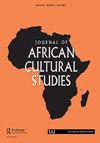Imagining Freedom with Keguro Macharia’s Frottage: Frictions of Intimacy across the Black Diaspora
IF 0.7
2区 社会学
Q2 CULTURAL STUDIES
引用次数: 0
Abstract
Keguro Macharia’s Frottage: Frictions of Intimacy across the Black Diaspora (2019) is consistent with what his readers have come to associate with his thought on the different platforms he inhabits. Across his blog, Gukira, his Twitter timeline and his scholarly writing is a consistent sense of curiosity, imagination, play, rigour, and commitment to widening the horizon of the possible. Macharia remains one of the most dexterously multi-lingual scholars I know; not in the usual sense of speaking multiple languages – though he does –, but in the sense of speaking multiple genres and code-switching between these so elegantly, as he toggles between bodies of ideas that on the surface seem inhospitable to each other. Who else can seat the opening formula for Kiswahili folklore –用Keguro Macharia的Frottage想象自由:散居黑人的亲密摩擦
凯古罗·马查里亚(Keguro Macharia)的《霜冻:黑人散居地的亲密关系》(Frottage:Frictions of Intimacy across the Black Diaspora)(2019)与他的读者在他居住的不同平台上对他的思想产生的联想一致。在他的博客、Gukira、他的推特时间线和他的学术写作中,都有一种始终如一的好奇心、想象力、游戏性、严谨性,并致力于拓宽可能性的视野。马查里亚仍然是我所认识的最精通多种语言的学者之一;不是通常意义上的说多种语言——尽管他说了——而是说多种类型的语言,以及在这些语言之间优雅地切换代码,因为他在表面上看起来彼此不友好的思想体之间切换。还有谁能主持斯瓦希里民间传说的开场白
本文章由计算机程序翻译,如有差异,请以英文原文为准。
求助全文
约1分钟内获得全文
求助全文
来源期刊

Journal of African Cultural Studies
Multiple-
CiteScore
1.70
自引率
10.00%
发文量
13
期刊介绍:
The Journal of African Cultural Studies publishes leading scholarship on African culture from inside and outside Africa, with a special commitment to Africa-based authors and to African languages. Our editorial policy encourages an interdisciplinary approach, involving humanities, including environmental humanities. The journal focuses on dimensions of African culture, performance arts, visual arts, music, cinema, the role of the media, the relationship between culture and power, as well as issues within such fields as popular culture in Africa, sociolinguistic topics of cultural interest, and culture and gender. We welcome in particular articles that show evidence of understanding life on the ground, and that demonstrate local knowledge and linguistic competence. We do not publish articles that offer mostly textual analyses of cultural products like novels and films, nor articles that are mostly historical or those based primarily on secondary (such as digital and library) sources. The journal has evolved from the journal African Languages and Cultures, founded in 1988 in the Department of the Languages and Cultures of Africa at the School of Oriental and African Studies, London. From 2019, it is published in association with the International African Institute, London. Journal of African Cultural Studies publishes original research articles. The journal also publishes an occasional Contemporary Conversations section, in which authors respond to current issues. The section has included reviews, interviews and invited response or position papers. We welcome proposals for future Contemporary Conversations themes.
 求助内容:
求助内容: 应助结果提醒方式:
应助结果提醒方式:


